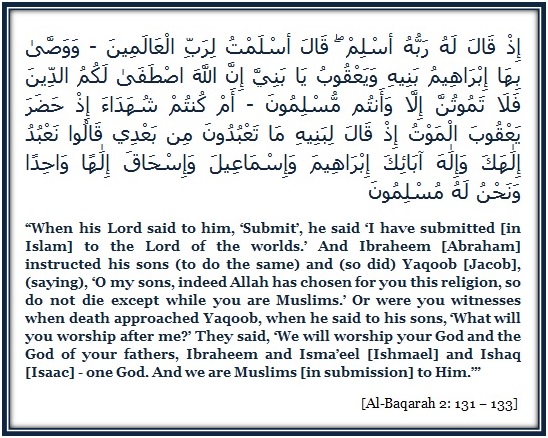Tafseer Surah Baqarah Verse 131-133 | Surah Baqarah explanation in English | Surah Baqarah explained | Surah Baqarah Ayat 131 to 133
Tafseer Surah Baqarah Verse 130 | Surah Baqarah explanation in English | Surah Baqarah explained | Surah Baqarah Ayat 130
Tafseer Surah Baqarah Verse 130 | Surah Baqarah explanation in English | Surah Baqarah explained | Surah Baqarah Ayat 130
Tafseer Surah Baqarah Verse 130 | Surah Baqarah explanation in English | Surah Baqarah explained | Surah Baqarah Ayat 130 Translation
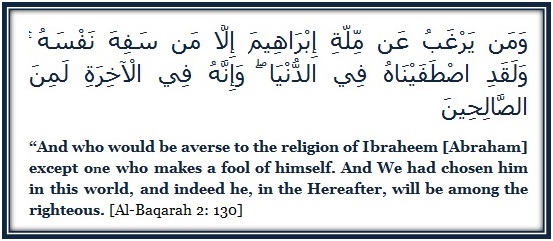 |
| Surah Baqarah Verse 130 |
فَلَماَّ رَأَى الشَّمْسَ بَازِغَةً قَالَ هَـذَا رَبِّى هَـذَآ أَكْبَرُ فَلَمَّآ أَفَلَتْ قَالَ يقَوْمِ إِنِّى بَرِىءٌ مِّمَّا تُشْرِكُونَ – إِنِّى وَجَّهْتُ وَجْهِىَ لِلَّذِى فَطَرَ السَّمَـوَتِ وَالاٌّرْضَ حَنِيفاً وَمَآ أَنَاْ مِنَ الْمُشْرِكِينَ
إِنَّ إِبْرَهِيمَ كَانَ أُمَّةً قَـنِتًا لِلَّهِ حَنِيفًا وَلَمْ يَكُ مِنَ الْمُشْرِكِينَ – شَاكِراً لانْعُمِهِ اجْتَبَـهُ وَهَدَاهُ إِلَى صِرَطٍ مُّسْتَقِيمٍ – وَءاتَيْنَـهُ فِى الْدُّنْيَا حَسَنَةً وَإِنَّهُ فِى الاٌّخِرَةِ لَمِنَ الصَّـلِحِينَ
Tafseer Surah Baqarah Verse 129 | Surah Baqarah explanation in English | Surah Baqarah explained | Surah Baqarah Ayat 129
Tafseer Surah Baqarah Verse 129 | Surah Baqarah explanation in English | Surah Baqarah explained | Surah Baqarah Ayat 129
Tafseer Surah Baqarah Verse 129 | Surah Baqarah explanation in English | Surah Baqarah explained | Surah Baqarah Ayat 129 Translation
إِنِّى رَسُولُ اللَّهِ إِلَيْكُم مُّصَدِّقاً لِّمَا بَيْنَ يَدَىَّ مِنَ التَّوْرَاةِ وَمُبَشِّراً بِرَسُولٍ يَأْتِى مِن بَعْدِى اسْمُهُ أَحْمَدُ
دَعْوَةُ أَبِي إِبْرَاهِيمَ وَبُشْرَى عِيسَى ابْنِ مَرْيَم
Tafseer Surah Baqarah Verse 128 | Surah Baqarah explanation in English | Surah Baqarah explained | Surah Baqarah Ayat 128
Tafseer Surah Baqarah Verse 128 | Surah Baqarah explanation in English | Surah Baqarah explained | Surah Baqarah Ayat 128
Tafseer Surah Baqarah Verse 128 | Surah Baqarah explanation in English | Surah Baqarah explained | Surah Baqarah Ayat 128 Translation
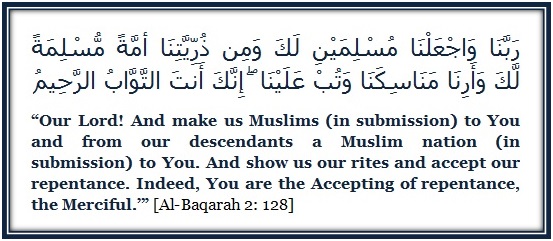 |
| Surah Baqarah Verse 128 |
رَبَّنَا هَبْ لَنَا مِنْ أَزْوَجِنَا وَذُرِّيَّـتِنَا قُرَّةَ أَعْيُنٍ وَاجْعَلْنَا لِلْمُتَّقِينَ إِمَاماً
إِذَا مَاتَ ابْنُ آدَمَ انْقَطَعَ عَمَلُهُ إِلَّا مِنْ ثَلَاثٍ: صَدَقَةٍ جَارِيَةٍ أَوْ عِلْمٍ يُنْتَفَعُ بِهِ أَوْ وَلَدٍ صَالِحٍ يَدْعُو لَه
Tafseer Surah Baqarah Verse 127 | Surah Baqarah explanation in English | Surah Baqarah explained | Surah Baqarah Ayat 127
Tafseer Surah Baqarah Verse 127 | Surah Baqarah explanation in English | Surah Baqarah explained | Surah Baqarah Ayat 127
Tafseer Surah Baqarah Verse 127 | Surah Baqarah explanation in English | Surah Baqarah explained | Surah Baqarah Ayat 127 Translation
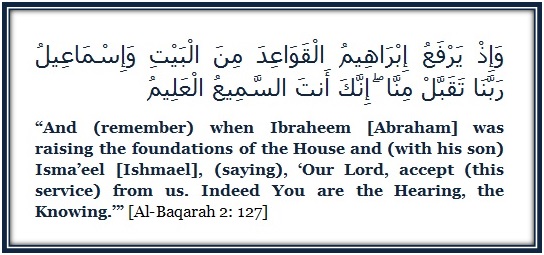 |
| Surah Baqarah Verse 127 |
Tafseer Surah Baqarah Verse 126 | Surah Baqarah explanation in English | Surah Baqarah explained | Surah Baqarah Ayat 126
Tafseer Surah Baqarah Verse 126 | Surah Baqarah explanation in English | Surah Baqarah explained | Surah Baqarah Ayat 126
Tafseer Surah Baqarah Verse 126 | Surah Baqarah explanation in English | Surah Baqarah explained | Surah Baqarah Ayat 126 Translation
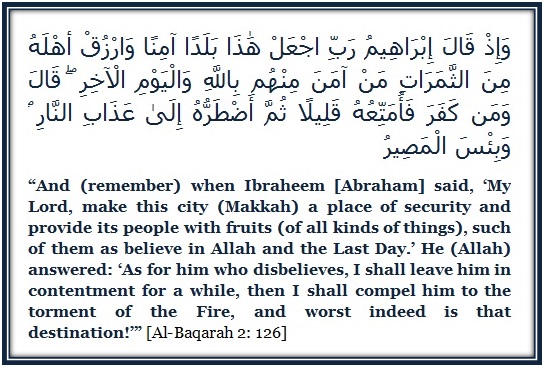 |
| Surah Baqarah Verse 126 |
وَمَن دَخَلَهُ كَانَ ءَامِناً
أَوَلَمْ يَرَوْاْ أَنَّا جَعَلْنَا حَرَماً ءامِناً وَيُتَخَطَّفُ النَّاسُ مِنْ حَوْلِهِمْ
لَا يَحِلُّ لِأَحَدٍ أَنْ يَحْمِلَ بِمَكَّةَ السِّلَاح
The Prophetic Wisdom
Tafseer Surah Baqarah Verse 125 | Surah Baqarah explanation in English | Surah Baqarah explained | Surah Baqarah Ayat 125
Tafseer Surah Baqarah Verse 125 | Surah Baqarah explanation in English | Surah Baqarah explained | Surah Baqarah Ayat 125
Tafseer Surah Baqarah Verse 125 | Surah Baqarah explanation in English | Surah Baqarah explained | Surah Baqarah Ayat 125 Translation
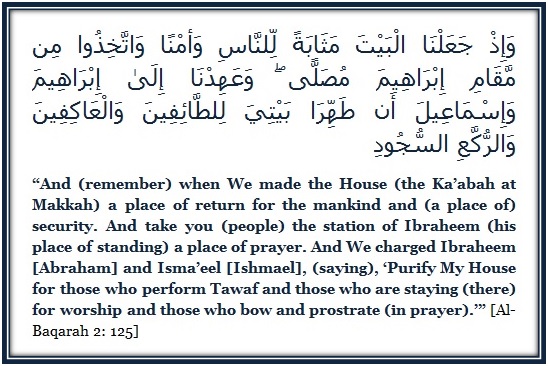 |
| Surah Baqarah Verse 125 |
وَإِذْ بَوَّأْنَا لإِبْرَهِيمَ مَكَانَ الْبَيْتِ أَن لاَّ تُشْرِكْ بِى شَيْئاً
إِنَّ أَوَّلَ بَيْتٍ وُضِعَ لِلنَّاسِ لَلَّذِى بِبَكَّةَ مُبَارَكاً وَهُدًى لِّلْعَـلَمِينَ فِيهِ ءَايَـتٌ بَيِّـنَـتٌ مَّقَامُ إِبْرَهِيمَ وَمَن دَخَلَهُ كَانَ ءَامِنا
اقْتَدُوا بِاللَّذَيْنِ مِنْ بَعْدِي أَبِي بَكْرٍ وَعُمَر
فِى بُيُوتٍ أَذِنَ اللَّهُ أَن تُرْفَعَ وَيُذْكَرَ فِيهَا اسْمُهُ يُسَبِّحُ لَهُ فِيهَا بِالْغُدُوِّ وَالاٌّصَالِ
Tafseer Surah Baqarah Verse 124 | Surah Baqarah explanation in English | Surah Baqarah explained | Surah Baqarah Ayat 124
Tafseer Surah Baqarah Verse 124 | Surah Baqarah explanation in English | Surah Baqarah explained | Surah Baqarah Ayat 124
Tafseer Surah Baqarah Verse 124 | Surah Baqarah explanation in English | Surah Baqarah explained | Surah Baqarah Ayat 124 Translation
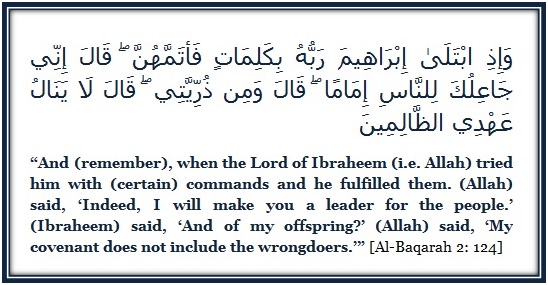 |
| Surah Baqarah Verse 124 |
Lessons:
Leadership is not a legacy to be transferred on to the children after one’s death. One has to strive and qualify for leadership through his skills and not lineage. Lineage will not benefit anyone unless one has righteous deeds and correct faith.
Kaise Ek Nek aurat se Pura Khandan Nek aur Dindar Banta hai?
Ek Deendar Mard se ek fard ki Zindagi sudhar jati hai magar ek Nek aur Deendar Khatoon se pura khandan Deendar ban jata hai.
وہ گرمیوں کی ایک تپتی دوپہر تھی۔
دفتر سے میں نے چھٹی لی ہوئی تھی کیونکہ گھر کے کچھ ضروری کام نمٹانے تھے۔
میں بچوں کو کمپیوٹر l سکھا رہا تھا کہ باہر بیل بجی۔
کافی دیر کے بعد دوسری بیل ہوئی تو میں نے جا کر دورازہ کھولا۔ سامنے میری ہی عمر کے ایک صاحب کھڑے تھے۔
"...السلام علیکم ۔۔۔۔!"
انہوں نے نہایت مہذب انداز میں سلام کیا۔ پہلے تو میرے ذہن میں خیال گزرا یہ کوئی چندہ وغیرہ لینے والے ہیں۔
ان کے چہرے پر داڑھی خوب سج رہی تھی، اور لباس سے وہ چندہ مانگنے والے ہر گز نہیں لگ رہے تھے۔
"جی فرمایئے" ، میں نے پوچھا۔
"آپ طاہر صاحب ہیں؟"
’’جی‘‘ میں نے مختصر جواب دیا۔
"وہ مجھے رفیق صاحب نے بھیجا ہے۔ غالباً آپ کو کرائے دار کی ضرورت ہے۔"
ہاں ہاں۔۔۔!
"مجھے اچانک یاد آیا کہ میں نے دفتر کے ایک ساتھی کو بتایا تھا کہ میں نے اپنے گھر کا اوپر والا پورشن کرائے پر دینا ہے اگر کوئی نیک اور چھوٹی سی فیملی اس کی نظر میں ہو تو بتائے۔
کیونکہ دفتر کی تنخواہ سے خرچے پورے نہیں ہوتے۔ مجھے افسوس ہوا کہ میں نے اتنی دھوپ میں کافی دیر اسے باہر کھڑا رکھا۔"
اسے چھ ماہ کے لیے مکان کرائے پر چاہیے تھا۔ کیونکہ اپنا مکان وہ گرا کر دوبارہ تعمیر کروا رہے تھے۔ میں نے تین ہزار کرایہ بتایا۔ لیکن بات دو ہزار پر پکی ہو گئی۔
وہ چلا گیا تو مجھے افسوس ہونے لگا کہ کرایہ کچھ کم ہے۔ گو اوپر صرف ایک چھوٹا سا کمرہ، کچن اور باتھ روم تھا۔
مجھے اپنی بیوی کا دھڑکا لگا ہوا تھا کہ اسے معلوم ہو گا تو کتنا جھگڑا ہوگا۔ اور وہی ہوا۔ بقول اس کے دو ہزار تو صرف بچوں کی فیس ہے۔ مجھے اس نے کافی برا بھلا کہا اور میں چپ چاپ سنتا رہا، اور اپنی قسمت کو کوستا رہا ۔
میں نے ایم ایس سی بہت اچھے نمبروں سے کیا تھا۔ اس لیے فوراً نوکری مل گئی، نوکری ملی تو شادی بھی فوراً ہو گئی۔
میری بیوی بھی بہت پڑھی لکھی تھی۔ وہ بھی ایک انگریزی اسکول میں پڑھاتی تھی، ہمارے تین بچے تھے۔ مگر گزارا مشکل سے ہوتا تھا۔
اگلے ہی دن وہ صاحب اور ان کے بیوی بچے ہمارے گھر شفٹ ہوگئے۔ ان کی بیوی نے مکمل شرعی پردہ کیا ہوا تھا۔ دونوں بڑے بچے بہت ہی مہذب اور خوبصورت تھے۔ چھوٹا گود میں تھا۔
کچھ دنوں بعد ایک دن میں دفتر سے آیا تو میری بیوی نے بتایا کہ میں نے بچوں کو کرائے دار خاتون سے قرآن مجید پڑھنے کے لیے بھیج دیا ہے۔ اچھا پڑھاتی ہیں، ان کے اپنے بچے اتنی خوبصورت تلاوت کرتے ہیں۔
مزید کچھ دن بعد جب میں نے ان کے ایک بیٹے سے تلاوت سنی تو پہلی مرتبہ میرے دل میں خواہش ابھری کہ کاش ہمارے بچے بھی اتنا اچھا قرآن مجید پڑھیں۔
ایک دن میں باہر جانے لگا تو اپنی بیوی سے پوچھ ہی لیا کہ وہ پارلر جائے گی تو لیتا چلوں۔ کیونکہ پہلے تو دو مہینے میں تین چار مرتبہ پارلر جاتی تھی اور اس مہینے میں ایک بار بھی نہیں گئی تھی۔
اس نے جواب دیا کہ پارلر فضول خرچی ہے۔ جتنی خوبصورتی چہرے پر پانچ بار وضو کرنے، نماز اور تلاوت سے آتی ہے کسی چیز سے نہیں آتی۔ اگر زیادہ ضرورت ہو تو گھریلو استعمال کی چیزوں سے ہی چہرے پر نکھار رہتا ہے۔
ایک روز میں کیبل پر ڈرامہ دیکھ رہا تھا تو میرے چھوٹے بیٹے نے مجھے بغیر پوچھے ٹی وی بند کر دیا اور میرے پاس آ کر بیٹھ گیا۔
"بابا یہ بیکار مشغلہ ہے۔ میں آپ کو اپنے نبی حضرت محمد صلی اللہ علیہ وسلم کا ایک واقعہ سناؤں۔"
مجھے غصہ تو بہت آیا لیکن اپنے بیٹے کی زبانی جب واقعہ سنا تو میرا دل بھر آیا۔
"یہ تمہیں کس نے بتایا"، میں نے پوچھا۔
"ہماری استانی محترمہ نے۔۔۔ وہ قرآن مجید پڑھانے کے بعد آپ صلی اللہ علیہ وسلم اور صحابہ کرام کے متعلق بتاتی ہیں۔"
اپنے گھر کی اور بیوی بچوں کی تیزی سے بدلتی حالت دیکھ کر میں حیران ہو رہا تھا کہ ایک روز بیوی نے کہا کہ کیبل کٹوادیں۔
کوئی نہیں دیکھتا اور ویسے بھی فضول خرچی اور اوپر سے گناہ ہے۔
چند روز بعد بیوی نے شاپنگ پر جانے کو کہا تو میں بخوشی تیار ہو گیا، اس نے کافی دنوں بعد شاپنگ کا کہا تھا ورنہ پہلے تو آئے دن بازار جانا رہتا تھا۔
"کیا خریدنا ہے؟"، میں نے پوچھا۔
’’برقعہ۔۔۔۔۔!!‘‘
کیا؟؟
میں ہنسا تو وہ بولی،
’’پہلے میں کتنے ہی غیر شرعی کام کرتی تھی، آپ نے کبھی مذاق نہیں اڑایا تھا، اب اچھا کام کرنا چاہتی ہوں تو آپ کو مذاق سوجھ رہا ہے۔‘‘
میں کچھ نہ بولا۔
پھر چند دن بعد اس نے مجھے کافی سارے پیسے دیئے اور کہا فریج کی باقی قیمت ادا کر دیں۔ تاکہ مزید قسطیں نہ دینی پڑیں۔
"اتنے روپوں کی بچت کیسے ہوگئی؟"
"بس ہو گئی"، وہ مسکرائی
"جب انسان اللہ کے بتائے ہوئے احکام پر چلنے لگے تو برکت خود بخود ہو جاتی ہے۔یہ بھی وہ کرائے دار خاتون بتایا ہے‘‘
سکون میرے اندر تک پھیل گیا۔ میری بیوی اب نہ مجھ سے کبھی لڑی، نہ شکایت کی۔ بچوں کو وہ گھر میں پڑھا دیتی ہے۔ خود بچوں کے ساتھ قرآن مجید تجوید سے پڑھنا سیکھ رہی تھی، وہ خود نماز پڑھنے لگی تھی، اور بچوں کو سختی سے نماز پڑھنے بھیجتی۔
مجھے احساس ہونے لگا کہ نجات کا راستہ یہی تو ہے۔ پیسہ اور آرائش سکون نہیں دیتا۔ اطمینان تو بس اللہ کی یاد میں ہے۔
مجھے اس دن دو ہزار کرایہ تھوڑا لگ رہا تھا، آج سوچتا ہوں تو لگتا ہے کہ وہ تو اتنا زیادہ تھا کہ آج میرا گھر سکون سے بھر گیا ہے۔
